| Srl | Item |
| 1 |
ID:
122362
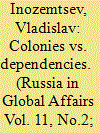

|
|
|
|
|
| Publication |
2013.
|
| Summary/Abstract |
It would be more logical to recognize only settler colonies as colonies per se and refer to all other results of expansion as dependencies. The loss of colonies is incomparably more dangerous for empires than the loss of dependencies. Trying to hold on to dependencies is meaningless, but to neglect the colonies is reckless.
|
|
|
|
|
|
|
|
|
|
|
|
|
|
|
|
| 2 |
ID:
118608
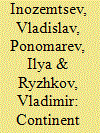

|
|
|
|
|
| Publication |
2012.
|
| Summary/Abstract |
Siberia is an immense territory that stretches for over 12.4 million square kilometers from the eastern slopes of the Urals to the Pacific Ocean. It took Russia more than four hundred years to develop this land in what proved to be the most ambitious colonization effort in history, during which one European people inhabited an area spanning from the eastern edge of Europe to the middle of North America's Pacific coast. Today Siberia's territory is large enough to easily accommodate any contemporary country. At the peak of the expansion (including Russian Alaska) this "European offshoot" (a term coined by Angus Maddison to denote territories occupied by European powers and subsequently inhabited mostly by descendants from Europe) was larger than the New World's Spanish colonies from Cape Horn to California and Texas, and could incorporate British territories in Asia three times over.
|
|
|
|
|
|
|
|
|
|
|
|
|
|
|
|
| 3 |
ID:
062373
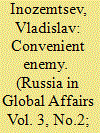

|
|
|
|
|
| Publication |
Apr-Jun 2005.
|
|
|
|
|
|
|
|
|
|
|
|
|
|
|
|
| 4 |
ID:
129536
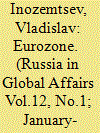

|
|
|
|
|
| Publication |
2014.
|
| Summary/Abstract |
The euro is a young currency that has all chances to make Europe a global player if the problems associated with its "premature birth" are solved in a decisive manner. The fiscal authorities should resort to extraordinary measures in order to accelerate economic growth, reduce unemployment, and boost the continent's competitiveness. For years the economic situation in Europe has been a matter of deep concern to politicians and economists. The European Union remains the largest economic power in the world, accounting for more than 20% of global gross product, possessing a huge export potential generating up to 16.4% of international trade with 161 of the world's top 500 companies, and with ample technological and financial resources. However, the EU economy is growing way too slow and its problems are becoming increasingly noticeable. The reason for this has been mentioned many times: poorly regulated public finance in the eurozone countries, which became particularly obvious during the global crisis of 2008-2009.
|
|
|
|
|
|
|
|
|
|
|
|
|
|
|
|
| 5 |
ID:
101706
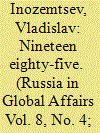

|
|
|
|
|
| Publication |
2010.
|
| Summary/Abstract |
On Monday, December 31, more than a quarter of century ago, the 1984th year since the birth of a legendary prophet, who, as believed, finished his earthly ordeal on the cross in the Roman province of Judaea, came to an end. That year was very much like many others, when the superpowers were fighting the Cold War and building up nuclear arsenals, the developed countries continued to struggle with recurring economic crises, and the developing nations with never-ending ones. It was just another year when people were born and died, when they dated each other, celebrated weddings, made professional and public careers, became national leaders and made scientific discoveries. The boldest forecasts for that year did not come true: the totalitarian regime George Orwell had described in his novel Nineteen Eighty-Four 35 years earlier had not conquered the globe, and the answer to Andrei Amalrik's question "Will the Soviet Union Survive Until 1984?" was in the affirmative.
|
|
|
|
|
|
|
|
|
|
|
|
|
|
|
|
| 6 |
ID:
088836
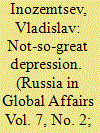

|
|
|
| 7 |
ID:
091353
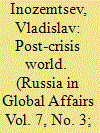

|
|
|
| 8 |
ID:
110458


|
|
|
|
|
| Publication |
2011.
|
| Summary/Abstract |
Illusory hopes that new technological possibilities will help create unlimited wealth have never come true. No invention can ensure a life of ease for decades. Of course, the world has changed - but, as the developments of recent years have shown, not to an extent that the established economic patterns should be discarded as worthless. The 21st-century world is a renewed yet still industrial world.
|
|
|
|
|
|
|
|
|
|
|
|
|
|
|
|
| 9 |
ID:
078201


|
|
|
|
|
| Publication |
2007.
|
| Summary/Abstract |
The year 2008 will be problematic because the bureaucratic class is divided. One part of the bureaucracy, which has gained control over substantial assets, is ready in principle to formally change the image of bureaucrats for the status of businessmen
|
|
|
|
|
|
|
|
|
|
|
|
|
|
|
|
| 10 |
ID:
069004


|
|
|